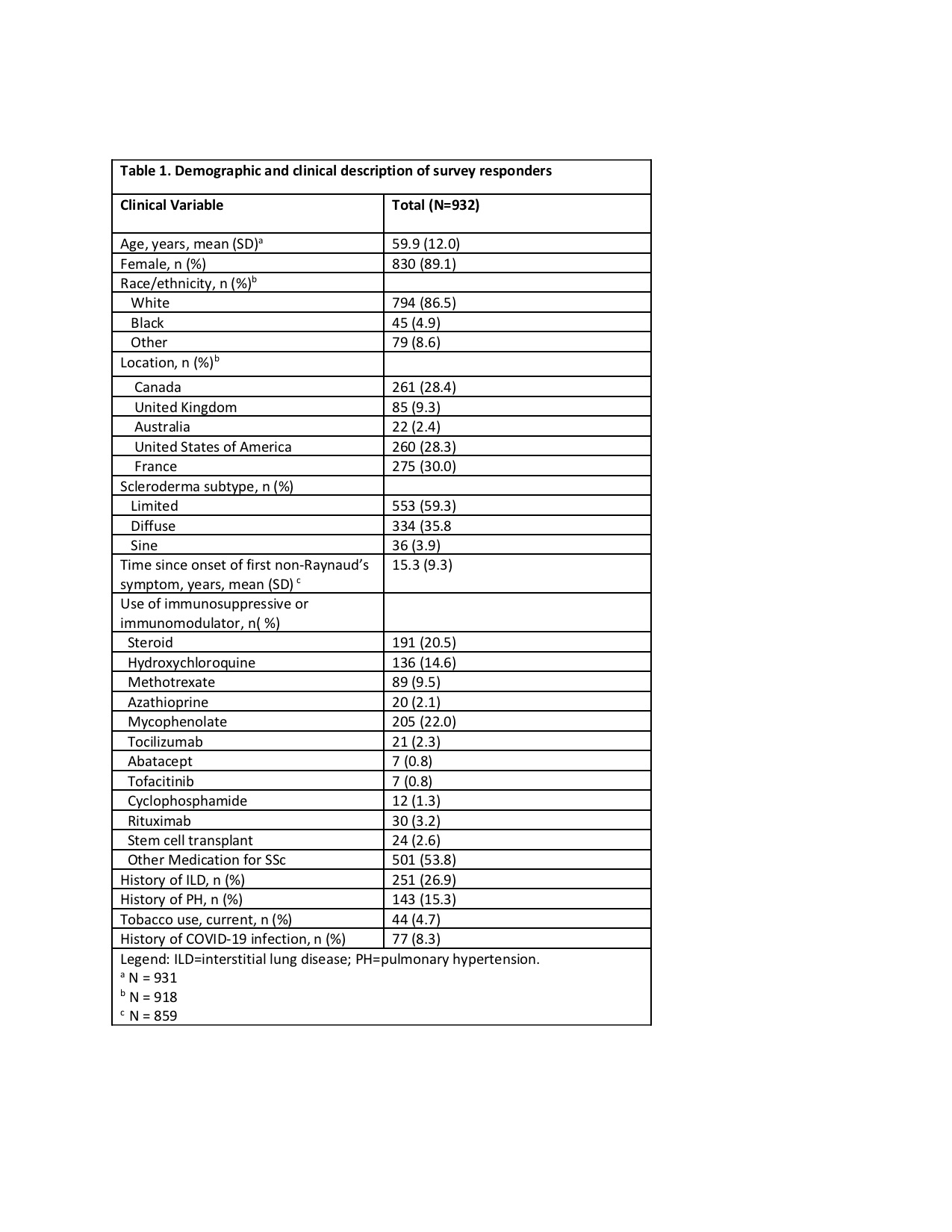Session Information
Date: Tuesday, November 9, 2021
Title: Systemic Sclerosis & Related Disorders – Clinical Poster III (1836–1861)
Session Type: Poster Session D
Session Time: 8:30AM-10:30AM
Background/Purpose: Hesitancy about COVID-19 vaccination exists among patients with rheumatic and musculoskeletal diseases, but previous studies have not assessed this specifically in patients with systemic sclerosis (SSc, or scleroderma). We surveyed patients enrolled in the Scleroderma Patient-centered Intervention Network (SPIN) Cohort regarding their willingness to be vaccinated as well as their perceptions and concerns about the vaccines.
Methods: Participants were adults with physician-verified SSc enrolled in the SPIN Cohort. SPIN includes 47 international centers and has approximately 1600 active participants. From April 9 to May 15, 2021, participants from the SPIN Cohort were invited by email and popups during regular SPIN Cohort assessments to participate in a COVID-19 vaccine survey, which was conducted in English and French. Participants were asked if they had received the vaccine and if not, whether they planned to and their degree of certainty. All were asked to rate factors of importance in the decision to get vaccinated using a 5-point Likert scale (1 – not important, 2 – slightly important, 3 – somewhat important, 4 – important, 5 – very important). These questions were developed based on previous surveys by SPIN investigators in conjunction with patient partners. Responses of those who had or who planned to receive the vaccine were compared to those who were unsure, unlikely or certainly would not get the vaccine. Descriptive statistics and t-tests for mean item differences are presented.
Results: The demographic and clinical characteristics of the 932 responders are shown in Table 1. Of these, 699 (75%) had received at least one dose of COVID-19 vaccine, and 842 (90.3%) had either been vaccinated or planned to do so. 90 participants (9.7%) reported feeling unsure [35 (3.8%)], unlikely [31 (3.4%)], or that they would certainly not [24 (2.6%)] get vaccinated.
Responses were compared based on hesitancy (table 2). Patients who received the vaccine or who planned to do so rated multiple considerations of higher importance than those who were hesitant. (2A) The highest mean differences were noted for the following factors: civic duty/setting an example, reducing risk of illness, protecting others. When asked about decision making about getting the vaccine, hesitant patients were more likely to rank as important or very important that enough time had passed to assess risk of long-term side effects and the experiences of other SSc patients. Compared to those who were hesitant, patients who had received the vaccine or who planned to were more likely to rank as important or highly important: their rheumatologist’s recommendation, the ability to discuss concerns with their doctor, and convenience. (2B)
Conclusion: Approximately 1 in 10 participants reported vaccine hesitancy. These results identify factors associated with hesitancy in this group of SSc patients and highlight topics that may be emphasized in providing education which may be helpful for hesitant SSc patients.
 Table 1. Demographic and clinical description of survey responders
Table 1. Demographic and clinical description of survey responders
 Table 2. Perceptions of patients based on degree of hesitancy
Table 2. Perceptions of patients based on degree of hesitancy
To cite this abstract in AMA style:
Gordon J, Showalter K, Wu Y, Kwakkenbos L, Carrier M, Henry R, Østbø N, Nordlund J, Bourgeault A, Canedo Ayala M, Discepola M, Carboni Jiménez A, Denton C, Mouthon L, Thombs B, Spiera R. Perceptions and Concerns Regarding COVID-19 Vaccination in Patients with Systemic Sclerosis in the Scleroderma Patient-centered Intervention Network (SPIN) Cohort [abstract]. Arthritis Rheumatol. 2021; 73 (suppl 9). https://acrabstracts.org/abstract/perceptions-and-concerns-regarding-covid-19-vaccination-in-patients-with-systemic-sclerosis-in-the-scleroderma-patient-centered-intervention-network-spin-cohort/. Accessed .« Back to ACR Convergence 2021
ACR Meeting Abstracts - https://acrabstracts.org/abstract/perceptions-and-concerns-regarding-covid-19-vaccination-in-patients-with-systemic-sclerosis-in-the-scleroderma-patient-centered-intervention-network-spin-cohort/
